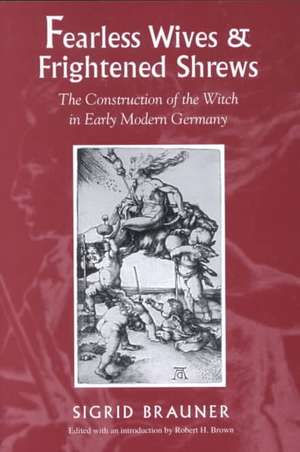Fearless Wives and Frightened Shrews: The Construction of the Witch in Early Modern Germany
Autor Reinharde Brauner, Rudolf Brauneren Limba Engleză Paperback – 19 iun 2001
In fifteenth-century Germany, women were singled out as witches for the first time in history; this book explores why. Sigrid Brauner examines the connections among three central developments in early modern Germany: a shift in gender roles for women; the rise of a new urban ideal of femininity; and the witch hunts that swept across Europe from 1435 to 1750.
Preț: 170.71 lei
Preț vechi: 197.61 lei
-14% Nou
Puncte Express: 256
Preț estimativ în valută:
32.68€ • 35.51$ • 27.47£
32.68€ • 35.51$ • 27.47£
Carte indisponibilă temporar
Doresc să fiu notificat când acest titlu va fi disponibil:
Se trimite...
Preluare comenzi: 021 569.72.76
Specificații
ISBN-13: 9781558492974
ISBN-10: 1558492976
Pagini: 184
Dimensiuni: 153 x 228 x 13 mm
Greutate: 0.29 kg
Ediția:First Edition
Editura: University of Massachusetts Press
Colecția University of Massachusetts Press
ISBN-10: 1558492976
Pagini: 184
Dimensiuni: 153 x 228 x 13 mm
Greutate: 0.29 kg
Ediția:First Edition
Editura: University of Massachusetts Press
Colecția University of Massachusetts Press
Notă biografică
Until her accidental death in 1992, Sigrid Brauner was assistant professor of German literature at the University of Massachusetts Amherst. Her book was edited for publication by her friend Robert H. Brown, author of Nature's Hidden Terror: Violent Nature Imagery in Eighteenth-Century Germany.
Recenzii
"In medieval discourse on witchcraft, Brauner argues, men and women were assumed to become witches in roughly equal numbers. But starting with the notorious Malleus Maleficarum (1487), witchcraft was reinterpreted as a gender-specific crime: its authors contentiously argued that most witches were women and linked the crime of witchcraft to women's voracious sexual appetites. Protestant authors such as Martin Luther, Paul Rebhun, and Hans Sachs. . . dismissed such lurid claims about women's sexuality. But they continued to see witchcraft as a female crime. . . . Most notably in Rebhun's and Sach's work, the witch is associated with disobedience to husbands and inappropriate gender behavior. Thus Brauner's careful and intelligent readings of these authors suggest . . . that preserving gender hierarchy may indeed have been a priority for German authorities."—Signs
"Brauner's book speaks expertly and persuasively to a diverse audience . . . interested in modern literary, cultural, and gender studies. . . . [It] is a pleasure to read."—German Quarterly
"Raises interesting questions about the genesis of the modern social problems of race, gender, and class oppression, and locates their roots in the early modern period."—Choice
"Brauner's book speaks expertly and persuasively to a diverse audience . . . interested in modern literary, cultural, and gender studies. . . . [It] is a pleasure to read."—German Quarterly
"Raises interesting questions about the genesis of the modern social problems of race, gender, and class oppression, and locates their roots in the early modern period."—Choice
